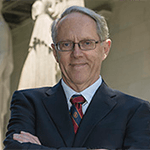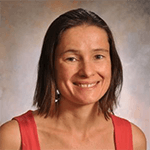Faculty
Biological Science

Robert Gibbons: Blum-Riese Professor of Medicine, Professor of Public Health Sciences, Departments of Medicine, Psychiatry and Faculty Associate, the Department of Comparative Human Development; Director, Center for Health Statistics.
Professor Gibbons’ major research interests are in the areas of biostatistics, environmental statistics, and psychometrics. Over the years, his interests have included non-linear mixed-effects models, item response theory, and statistical issues in drug safety.

Don Hedeker: Professor of Public Health Sciences (Biostatistics) Department of Public Health Sciences.
Professor Hedeker’s main area of expertise is in the development and use of advanced statistical methods for clustered and longitudinal data, with particular emphasis on mixed-effects models for intensive longitudinal data including data from ecological momentary assessment (EMA). He is the primary author of four freeware computer programs for mixed-effects analysis: MIXREG for normal-theory models, MIXOR for dichotomous and ordinal outcomes, MIXNO for nominal outcomes, and MIXPREG for counts.

Andrey Rzhetsky: Professor of Medicine, Department of Medicine; Professor, Department of Human Genetics; Senior Fellow, Computation Institute; Senior Fellow, Institute for Genomics and Systems Biology.
Professor Rzhetsky is engaged in a series of computational projects that involve mathematical modeling and analysis of disparate data sets, such as electronic medical records, scientific texts, and high-throughput experimental data. The overarching goal of such analyses is formulating and testing hypotheses regarding interplay of genetic and environmental mechanisms of human disease.
Booth School of Business

Veronika Rockova: Bruce Lindsay Professor of Econometrics and Statistics in the Wallman Society of Fellows at the Booth School of Business at the University of Chicago.
Professor Rockova’s work brings together statistical methodology, theory and computation to develop high performance tools for analyzing large datasets. Her research interests reside at the intersection of Bayesian and frequentist statistics, and include: data mining, variable selection, optimization, non-parametric methods, factor models, high-dimensional decision theory and inference.
Social Science

John Brehm: Professor of Political Science; Co-Director of Quantitative Social Analysis. Professor Brehm studies American political behavior, focusing on public opinion and political organizations, and conducts research in statistical methods for political science.

James Evans: Max Palevsky Professor; Director, Knowledge Lab; Faculty Director, Masters Program in Computational Social Sciences; External Professor, Santa Fe Institute.
Professor Evans is interested in the role that social and technical institutions, e.g. the Internet, markets, collaborations, play in collective cognition and discovery. He uses machine learning, generative modeling, social and semantic network representations to explore knowledge processes, scale up interpretive and field-methods, and create alternatives to current discovery regimes.

James Heckman: The Henry Schultz Distinguished Service Professor in Economics and the College; Director of Center for the Economics of Human Development.
Professor Heckman’s research is devoted to understanding and addressing major social issues such as inequality, social mobility and effective policies for promoting human opportunity. In 2000, Heckman shared the Nobel Prize in Economics for his work on the microeconometrics of diversity and heterogeneity and for establishing a sound causal basis for public policy evaluation

Guanglei Hong: Professor Comparative Human Development; Chair, Committee on Education
Professor Hong develops causal inference theories and methods for evaluating educational and social policies and programs in multi-level longitudinal settings. The current focus of her research is on designs and methods for revealing causal mediation mechanisms and spillover effects.

Stephen Raudenbush: Lewis-Sebring Distinguished Service Professor, Department of Sociology, the College, and the Harris School of Public Policy Studies. Professor Raudenbush is interested in statistical models for child and youth development within social settings such as classrooms, schools, and neighborhoods. He is best known for his work developing hierarchical linear models, with broad applications in the design and analysis of longitudinal and multilevel research.

Kazuo Yamaguchi: Ralph Lewis Professor of Sociology.
Professor Yamaguchi is interested in statistical models for social data and mathematical models for social phenomena, the life course, rational choice, exchange networks, stratification and mobility, demography for family and employment, process of drug use progression and Japanese society.

Geoffrey Wodtke: Professor, Department of Sociology; Associate Director, Stone Center for Research on Wealth Inequality and Mobility. Professor Wodtke’s research is in the areas of neighborhood effects and urban poverty, group conflict and racial attitudes, class structure and income inequality, and methods of causal inference in observational research. He is currently working on several projects dealing with the impacts of neighborhood poverty on child development, and new methods for estimating causal effects in longitudinal studies. His previous work on these topics has been published in the American Sociological Review, American Journal of Sociology, Demography, and Sociological Methodology, among other outlets. Wodtke completed his PhD in Sociology at the University of Michigan in 2014, where he also earned his MA in statistics.
Public Policy

Christopher Berry: William J. and Alicia Townsend Friedman Professor; Academic Director, Mansueto Institute for Urban Innovation.
Professor Berry’s research interests include metropolitan governance, the politics of public finance, and intergovernmental fiscal relations.

Steven Durlauf: Frank P. Hixon Distinguished Service Professor and Director of the Stone Center for Research on Wealth Inequality and Mobility, Harris School of Public Policy; Chair, Committee on Quantitative Methods in Social, Behavioral, and Health Sciences.
Professor Durlauf’s major methodological contributions include both economic theory and econometrics. He helped pioneer the application of statistical mechanics techniques to the modelling of socioeconomic behavior and has developed identification analyses for the empirical analogs of these models.

Anthony Fowler: Sydney A. Stein Jr. Professor, Harris School of Public Policy.
Professor Fowler’s research applies econometric methods for causal inference to questions in political science, with particular emphasis on elections and political representation.

Colm O’Muircheartaigh: Professor, Harris School of Public Policy.
Professor O’Muircheartaigh’s research encompasses survey sample design, measurement errors in surveys, cognitive aspects of question wording, and latent variable models for nonresponse. He is a senior fellow in NORC, where he is responsible for the development of methodological innovations in sample design.
Physical Science

Xinran Li: Assistant Professor in the Department of Statistics and the College at the University of Chicago. Xinran’s research focuses mainly on developing novel methodologies for causal inference. He specializes in randomization-based inference for causal effects, sensitivity analysis for observational studies, experimental design such as rerandomization, and Bayesian inference. He also applies these methodologies to social and biomedical sciences, and is passionate about exploring new avenues to apply and advance these methodologies.
Associate Members
Physical Science

Stephen Stigler: Ernest DeWitt Burton Distinguished Service Professor Emeritus Department of Statistics and the College Committee on Conceptual and Historical Studies of Science.
Professor Stigler is an expert on the history of statistics, particularly the development of statistical methods in the natural and social sciences.
Biological Science

Lin Chen: Professor of Public Health Sciences, Department of Public Health Sciences.
Professor Chen works on developing statistical methods for high-dimensional genomics data and exploring the theory behind them. She is an expert on multivariate analysis in genetic association studies, methods for complex missing data in proteomics studies, and methods for integrative genomics.
Booth School of Business

Bryon Aragam: Associate Professor of Econometrics and Statistics and Robert H. Topel Faculty Scholar, Booth School of Business.
Professor Aragam’s research interests include statistical machine learning, nonparametric statistics, and unsupervised learning, with a particular focus on applications related to causal inference, personalization, and clustering. His current research is on integrating deep learning and causality, latent variable modeling, and foundational aspects of nonparametric inference with an eye towards machine learning applications. He is also interested in open-source software development and problems in interpretability, ethics, and fairness in AI.

Panos Toulis : Associate Professor of Econometrics and Statistics, and John E. Jeuck Faculty Fellow, Booth School of Business.
Professor Toulis studies causal inference in complex settings, such as networks or multi-agent economies. He is also interested in the interface of statistics and optimization, particularly in inference problems on large data sets through stochastic gradient descent.
Public Policy

Dan Black : Professor, Harris School of Public Policy; Senior Fellow, National Opinion Research Center. Professor Black researches labor economics and applied econometrics, focusing on family formations, household production, urban labor markets, human capital theory, and the economic progress of African Americans.
Social Science

Marc Berman: Professor of Psychology; Director, Environmental Neuroscience Lab.
Professor Berman studies the ability of natural environments to improve affect, attention, and memory. He is interested in brain network efficiency and its relationship to broad behaviors (e.g., self-control). He has specialties in multivariate analysis and environmental neuroscience.

Lars Peter Hansen: David Rockefeller Distinguished Service Professor in Economics, Statistics and the Booth School of Business; Director, Macro Financial Research Initiative
Lars Peter Hansen is the David Rockefeller Distinguished Service Professor in Economics and Statistics at the University of Chicago. He was the inaugural director of the Becker Friedman Institute until July of 2017. He currently directs the Macro Financial Research Initiative housed under the Becker Friedman Institute. In 2013, he was a recipient of the Sverges Riksbank Prize in Economic Sciences in Memory of Alfred Nobel. Hansen is known for making fundamental advances in our under-standing of how agents cope with changing and risky environments. He has contributed to the development of statistical methods designed to explore the interconnections between macro-economic indicators and assets in financial markets.

Monika Nalepa : Professor, Political Science; Director, Transitional Justice and Democratic Stability Lab.
Professor Nalepa studies post-communist Europe, transitional justice, and parties and legislatures. She is specialized in applying game-theoretic approaches to comparative politics.
Senior Instructional Professor

Yanyan Sheng: Senior Instructional Professor and Associate Director of the Committee on Quantitative Methods in Social, Behavioral, and Health Sciences. Her primary research interests focus on modeling dichotomous responses in educational and psychological measurement using advanced modern statistics, specifically, on developing and applying complex, yet efficient Bayesian hierarchical item response models.
